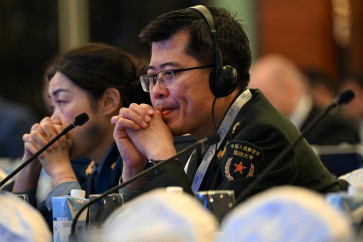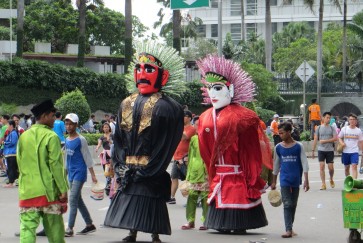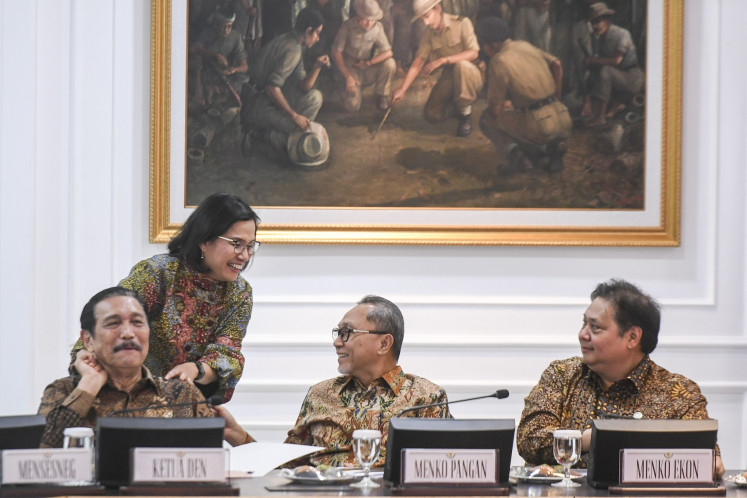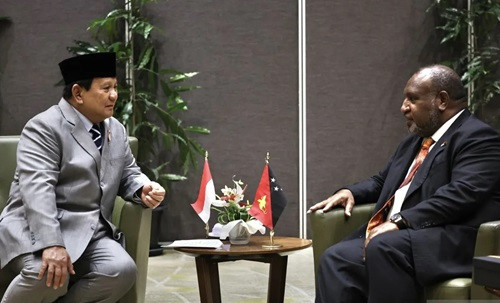Our society vs 'Vicky' unusual language controversy
Marrying English terms with âintellectualâ words into odd and unfit sentences, Vicky Prasetyo became a one hit wonder that flooded my digital timeline
Change text size
Gift Premium Articles
to Anyone

M
arrying English terms with 'intellectual' words into odd and unfit sentences, Vicky Prasetyo became a one hit wonder that flooded my digital timeline. Everyone seems to have a piece of their mind to share about him and his words are quoted numerously, from the famous 'heart controversy' to the 'harmonization'.
But what is so funny about a guy who misused words to appear wealthy and intellectual?
For those who missed the hype, it started with a small interview on TV program ' uploaded to YouTube' where Vicky, at the time fiancé to an Indonesian dangdut singer and dancer expressed his thoughts about his relationship and future.
Like anyone his age ('29 my age' as he confidently told us), he had doubts and fears about the future and was thinking about settling down. He threw nonsensical phrases such as 'heart controversy'; 'wealth conspiracy'; 'wealth statutization', while confidently misplaced the word 'coup d'etat', and adding the made up suffix '-itization' (or ''isisasi' in Indonesian) to words throughout the interview.
Within a few fast hours, another video of him appeared on Facebook and Twitter, obsessively shared by almost everyone I know. A twitter account with the handle @VickyPrasetyo_ was created, gaining 16.1K followers in a course of two days with around 300 tweets.
What makes Vicky so special? Aren't we all doing just the same? Consciously putting English words here and there in our Indonesian conversation? Pretentiously selecting the wordings based on who we speak to?
Once a young student, I remember playing with words such as vis-a-vis, quotidian, per se or raison d'etre to gain academic credibility for my thoughts and actions. Also now I often hear people referring to their infants with the English word baby instead of using the perfectly good Indonesian word bayi. Malls and plazas are mix breeds of English and Indonesian grammar and government banners are introducing words such as sinergitas, which may refer to synergy.
Some, like Vicky, have more imagination than others. A well-educated person I once knew, was fond of the word 'prestation' ' an English hybrid word out of the Indonesian-Dutch-originated-word prestasi or achievement in English ' and 'frequention'. He thought '-ion' was the way to speak English and 'frequency' just did not seem English enough.
Being able to speak English and mastering the 'intelligent' and 'complicated' language seems to be one of the things the Indonesian middle class is striving for. In a cigarette ad a few years back we were brought to laughter when in the story, the main character tried his best to speak English at a job interview, only to find that his bule interviewer spoke Javanese perfectly. Stepping out successfully from the interview, he boasted to his mates, 'English', he said with a thick Javanese accent, 'is very easy'. His pretentious act failed as the bule employer came out and greeted him in Javanese, making his act a mere ostentation and him the butt of the joke.
A happier ending story of 'fakin' it til you're makin' it' is My Fair Lady. A British movie set in the 1960s, Eliza, played by Audrey Hepburn, is a young and poor flower seller who is trained by a professor named Higgins to be a British upper class lady. Higgins believed that social groups are not only determined by what a person wears or how she behaves, but moreover, it can also be indicated by ones' pronunciations, accents and even tone of voice.
Luckier than the cigarette ad guy or our hero Vicky, in this story Eliza successfully advanced in to upper class English society with her trained accent and choice of words.
Peppering your talk with foreign words is perceived as signs of membership in the cosmopolitan community, subtly implying overseas travels, multinational business deals and exotic names on your Facebook friend list. This status is considered important in our society, as words or language can be treated as a capital, or to be exact, 'linguistic capitals' (Bourdieu: 1982).
Words are never innocent. They carries with them a set of values internalized based on how individuals are brought up. In this playground of words, the use of complex, exotic terms can be perceived as a capital that distinguishes it against regular terminologies. In other words, it's like carrying a Louis Vuitton (LV) bag in the sea of generic Chinese made bags.
With less success in comparison to Eliza, what Vicky inadvertently did was to draw another distinguishing boundary between those who succeed in faking it (thus, us) and those who failed (him). By laughing at him, we distinguish ourselves from the 'fake fakers'. Our limited linguistic capital seems more authentic in comparison to Vicky's.
In the LV allegory, we can simply say he bought his copied LV bag with a quality as such that we can instantly spot its fakeness ' a disgrace to all counterfeiters. Whereas we, along with Eliza, are the luckier ones who are able to lend and utilize the linguistic capitals in a smoother way. Hence, our fake LV bags seem to be much worthy.
Setting all laughs aside, Vicky's tenacity for social mobility is worrying in itself. His struggle to belong to a social class is similar to Indonesian society at large, it might be best for us to pause our laughs for a second and take a look at ourselves. To what extent are we willing to transgress boundaries for the desired cosmopolitan life? Will we fake other capitals, like financial ones? Would we steal, forge or in some cases, even legalize corruption to feed our need to belong?
The writer is a graduate of University of Leuven, Belgium.









